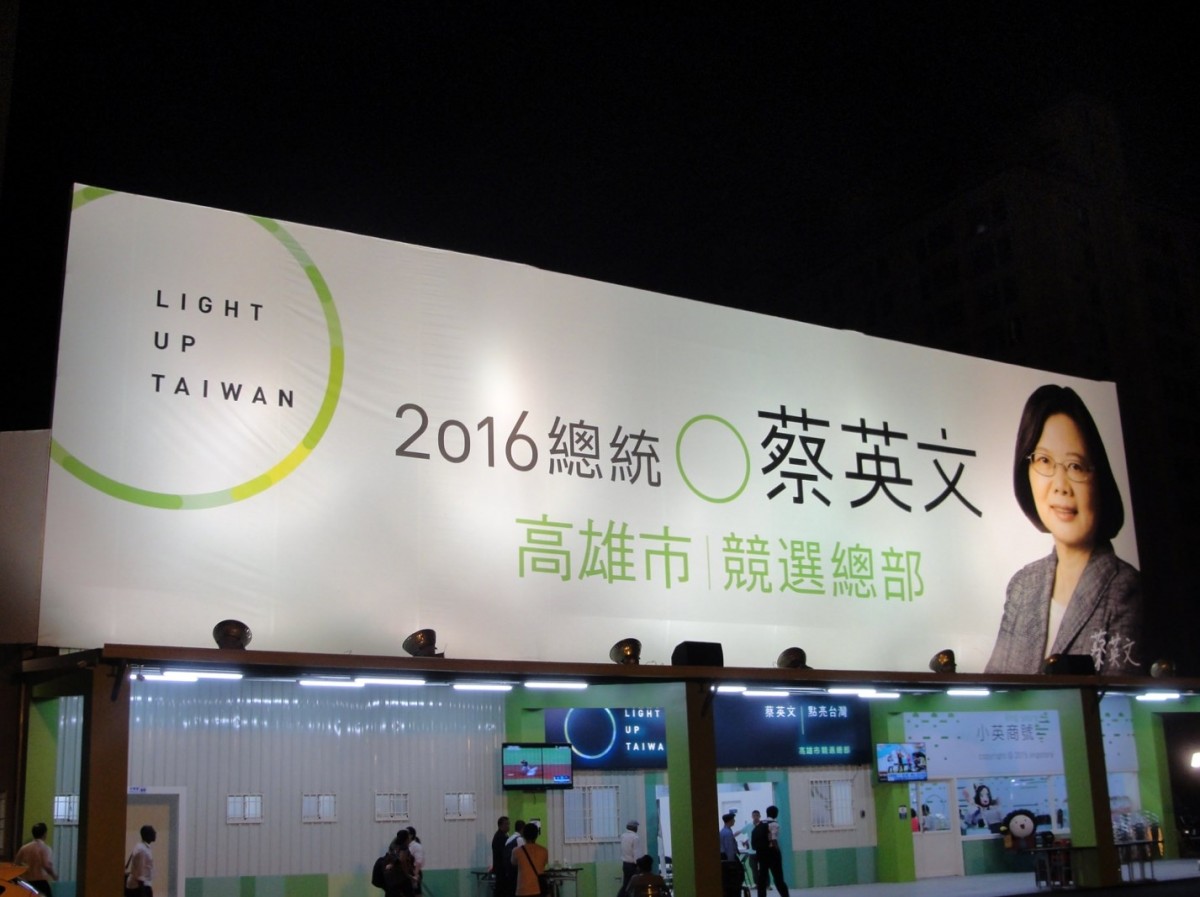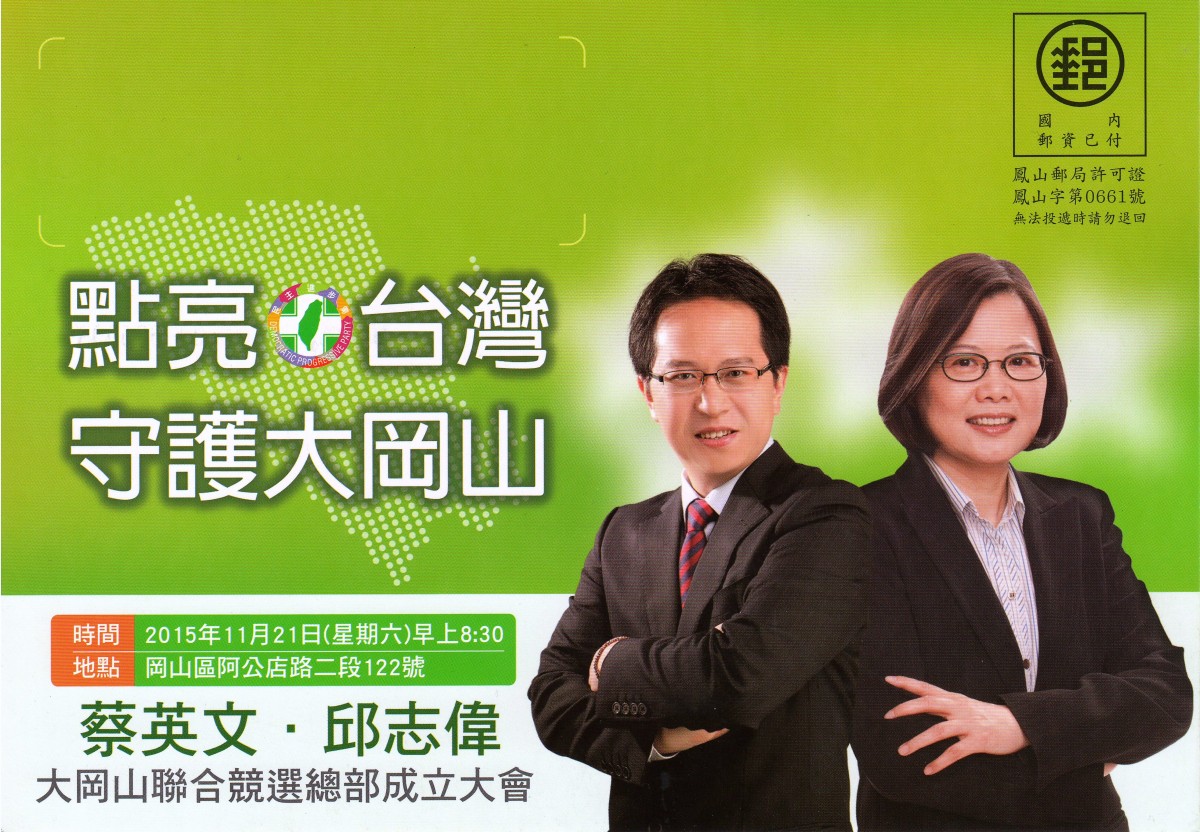Memo #353
By: Justin Kwan – justin.kwan [at] alumni.ubc.ca
 While the historic meeting between Ma Ying-jeou and Xi Jinping, the first between the leaders of the two sides of the Taiwan Strait, has been described as Beijing’s way to “pre-emptively constrain the Democratic Progressive Party [DPP] ahead of its likely victory,” its effect on the upcoming Taiwan’s domestic politics has been more salient for generating pressure on the DPP Presidential Candidate Tsai Ing-wen to better define her Cross-Strait policy before the January 2016 election.
While the historic meeting between Ma Ying-jeou and Xi Jinping, the first between the leaders of the two sides of the Taiwan Strait, has been described as Beijing’s way to “pre-emptively constrain the Democratic Progressive Party [DPP] ahead of its likely victory,” its effect on the upcoming Taiwan’s domestic politics has been more salient for generating pressure on the DPP Presidential Candidate Tsai Ing-wen to better define her Cross-Strait policy before the January 2016 election.
Tsai’s opponent, Kuomintang (KMT) Presidential Candidate Eric Chu, has been using the Ma-Xi meeting to argue that only the KMT can peacefully deal with Cross-Strait Relations. Chu has criticized Tsai for “dodg[ing]…questions on how the status quo can be maintained without the DPP recognizing the foundation of the [1992] consensus.”
In the 2012 presidential election, Tsai campaigned under a pro-Taiwan platform which sought a “Taiwan Consensus,” aligned with her party’s independence viewpoint. However, this time around, Tsai has remained relatively quiet on Cross-Strait issues. The public knows that Tsai, as former Chair of the Mainland Affairs Council, is experienced in Cross-Strait negotiations.
But Tsai and the DPP are concerned about alienating one of the two pillars of its popular support. Tsai must adhere to a moderate position between her core Pan-Green supporters who want independence and the voters she has captured by moving her party towards the centre of Taiwan’s political spectrum. Although the latter move has significantly increased the DPP’s popularity, it has come at the cost of silencing increasingly impatient independence supporters.
By adhering to the position that the DPP will maintain the status-quo, Tsai has avoided exacerbating internal party divisions. However, the Ma-Xi meeting is a reminder that the status quo is already shifting towards closer ties between the Mainland and Taiwan. The KMT in this respect has gained the upper hand to force Tsai to respond.
Although Tsai holds a significant lead over her opponents in the polls, her victory is hardly guaranteed. As the candidates prepare for the upcoming Presidential Televised Debates, Chu’s next strategy will be to confront Tsai and discredit her Cross-Strait policy. Where the DPP leader stands on the important issues of economic integration with and political autonomy from the PRC will be a key point the remaining days of the campaign.
About the Author:
Justin Kwan is a Master of Arts Candidate in Asia Pacific Policy Studies at the University of British Columbia. His research examines Hong Kong and Taiwan from a comparative perspective. Follow him on Twitter or visit his webpage.
If you enjoyed this memo, subscribe to our e-newsletter for free and receive new memos weekly via email.

DPP Presidential Candidate Tsai Ing-wen showcases her party’s 2016 campaign slogan: “Light up Taiwan” (Credit: Justin Kwan, 2015).

Tsai Ing-wen poses with Chiu Chih-wei, the local DPP candidate for the No. 2 District in Kaohsiung. The top left headline reads: “Light up Taiwan, Protect the Greater Gangshan District” (Credit: Retrieved by Justin Kwan from the DPP Kaohsiung Regional Headquarters, 2015).
Links
- Tsai Ing-wen, Ing’s Clique: The Last Mile to Light Up Taiwan (Chinese) 英派:點亮台灣的這一哩路 (Taipei: Eurasian Press Ltd), 2015.
- Taiwan Mood Barometer Survey, “Public Opinion Release: An investigation into the development of Taiwan’s Public Sentiments Towards the General Election and the Ma-Xi Meeting,” (Chinese) 「台灣民心動態調查、大選與馬習會」民調新聞稿, Taiwan Indicators Survey Research, November 11, 2015.
- Chin-Hao Huang and Patrick James, “Blue, Green or Aquamarine? Taiwan and the Status Quo Preference in Cross-Strait Relations,” The China Quarterly Vol 219, (September 2014).
- Phillip Wen, “China and Taiwan a ‘family’, says Xi Jinping at historic meeting of leaders,” The Sydney Morning Herald, November 8, 2015.
- Emily S. Chen, “The DPP’s strategic ambiguity toward China,” Center for Strategic and International Studies PacNet 51, August 19, 2015.
- J. Michael Cole, “The Ma-Xi Summit: Democracy is Thicker than Blood,” The National Interest, November 9, 2015.
Related Memos:
This memo is the first in a two part series about Taiwan’s 2016 Presidential Election. View part two, Memo #354: Restoring Political Trust: Reducing the KMT’s Electoral Defeat.
See our other memos on Taiwan.
This piece has a deep pro-KMT slant that, purposeful or not, comprehensively misunderstands the cross strait issue in the current election:
+++++++++++++++++++++++
…. its effect on the upcoming Taiwan’s domestic politics has been more salient for generating pressure on the DPP Presidential Candidate Tsai Ing-wen to better define her Cross-Strait policy before the January 2016 election.
++++++++++++++++++++++
This understanding is totally backwards. The MaXi Circus had little effect on voters, except to confirm them in the current judgment that Ma is too close to China and Tsai will better protect Taiwan’s interests. This is confirmed in polls that ask this question; see the recent TISR polls translated at solidaritytw.tumblr.com. It seems that the writer is unfamiliar with the numbers, or has chosen to ignore them.
The idea that Tsai must prove herself is strictly a piece of KMT propaganda. The reality for Taiwan’s electorate is that the KMT must show it is not too close to China. Since its China policies have uniformly been failures for Taiwan’s economy, the voters will likely punish it in Jan.
Indeed, the stated reason of the KMT for getting rid of its previous presidential candidate was that her China policies are out of step with the Taiwan mainstream. Since Chu’s are hardly different, Chu’s poll numbers have fallen into her territory.
+++++
Tsai’s opponent, Kuomintang (KMT) Presidential Candidate Eric Chu, has been using the Ma-Xi meeting to argue that only the KMT can peacefully deal with Cross-Strait Relations. Chu has criticized Tsai for “dodg[ing]…questions on how the status quo can be maintained without the DPP recognizing the foundation of the [1992] consensus.
++++++++
This is standard KMT rhetoric for the past 5 elections. It would go on whether or not the MaXi Circus occurred. The public is tired of it. As noted above, it is nonsense.
The public does not support the 1992 Consensus as polls show. For example, the 1992 Consensus has 34% support in this pro-KMT CSPA poll: http://solidaritytw.tumblr.com/post/132858123186/chinas-framework-still-unacceptable-to-taiwanese?is_related_post=1
In any case the 1992 Consensus is merely a cage for the KMT to imprison DPP policy. The actual basis for KMT-CCP cooperation is China’s desire to annex Taiwan, period.
+++++++++++
By adhering to the position that the DPP will maintain the status-quo, Tsai has avoided exacerbating internal party divisions. However, the Ma-Xi meeting is a reminder that the status quo is already shifting towards closer ties between the Mainland and Taiwan. The KMT in this respect has gained the upper hand to force Tsai to respond.
+++++++++++
The idea that the KMT “has the upper hand” is not supported either by the previous several elections or by recent polls. No evidence is forwarded by the author to support this claim, probably because it is a pro-KMT fantasy. The “closer ties” are not defined herein because the author either does not know, or cannot face, that such ties are between the two expansionist Chinese parties that want to annex Taiwan to China, the KMT and the CCP, and not between “Taiwan” and China. The public is quite clear that it wants the (limited) economic benefits from ties with China, and does not want the kind of “closeness” the KMT and CCP espouse. That is why — let me remind readers — that is why the KMT is going to get blown out in this election.
+++++++++++
Although Tsai holds a significant lead over her opponents in the polls, her victory is hardly guaranteed.
++++++++++
Perhaps, but less than 60 days are left and no miracle is showing in either party internal or public polls. The legislative election is also going to be a blow out DPP victory. The only mystery is how large it is going to be.
The author simply fails to note any major trends that favor the DPP, focusing on elaborating a tiny piece of KMT propaganda. Why is Tsai going to win?
1. The public is sick of the KMT. This does not mean it supports the DPP per se, but few outside the mainlander core support it. The new KMT Veep candidate was recently found to be living in cheap government housing to save money to speculate in real estate, apparently using her connections to buy and sell old soldier houses. This sort of unethical behavior is par for the KMT course, and the public is sick of it. It wants clean air, clean food, and good governance. The KMT is a big business party incapable of delivering on these items.
2. Demographics: the KMT base is old and dying. The young are profoundly pro-Taiwan and will vote against the KMT. The internet is solidly pro-Taiwan and most of the young get their information from that.
3. Political geography: 60% of the population lives under DPP mayors and their appointments. That means that the traditional source of local power for the KMT, the local factions, will have to either turn towards the DPP or forego appointments and patronage. Moreover, the KMT has no large base to cultivate its politicians, everything in the center and south is DPP and likely to stay that way for another decade.
4. Colonial transition: the KMT is not a political party but the political organization of a colonial elite. Unlike the colonial elites of England or the US, it cannot replenish itself with fresh people from the motherland, it can only give birth to them. The children of KMT elites don’t want to get involved in politics and many of them (like President Ma’s daughter) are foreign citizens. There’s no third bumper crop of talented mainlander politicians there to take up the KMT banner.
5. KMT organization. Another problem caused by the KMT’s ethnic colonial structure is that there is no structure for bringing up promising Taiwanese into the higher ranks of the party. Hence the KMT cannot be a career path like the DPP or a western political party and cannot replenish itself without its mainlander core giving up their hold on the party. Faction politicians can’t rise from their local areas to the national level.
Etc…etc… From its demographics to its China policy, the KMT is in deep trouble. The two most likely paths: complete collapse to a tiny core of pro-China nutters, or Taiwanization and a new KMT. This will take a couple more election cycles either way, but within a decade, it is likely the KMT we now know will be significantly altered.
Michael Turton
The View from Taiwan
Dear Michael,
Thank you for your comments on my recent Asia Pacific Memo (more so for 353 than for the more ad hominem ones in 354). I very much welcome an open conversation about Taiwanese politics; especially those regarding the upcoming election. However, I would like to respond to some of your comments as I believe some of my sentences may have been misunderstood within the context of this memo.
The objective of this Asia Pacific Memo is not to highlight all of the ongoing current events related to Taiwan’s 2016 election, but rather, focuses on one salient point per memo. The point of concern that is raised is what Tsai Ing-wen and the DPP’s current stance is on Cross Strait Relations.
Your first comment seems to misinterpret the way in which the Ma-Xi meeting is being utilized as a political tool. The “pressure” refers not to public pressure, but the pressure that the KMT will use to demonstrate that the meeting, even if only symbolic in nature, demonstrates the party’s argument for stability in Cross-Strait Relations. The KMT is likely to use this as a point of contention in the remaining days of the election, whether or not the public is interested in this or not, and even if the KMT rhetoric has been quite similar over the past elections.
My point was not prescriptive (i.e. should or must); rather it was simply an observation about this likelihood. Beijing will also make it difficult for a DPP government to engage in a Cross-strait dialogue. The Ma-Xi meeting can be seen as an attempt to forestall any major changes a DPP government may choose to make in the likely event that it is elected. This would mean that Tsai’s Cross-Strait Policy will undoubtedly be compared to the immediately preceding Ma-Xi meeting. Will Tsai be able to hold cross-strait dialogue with China? If yes, then the Ma-Xi Meeting will have little significance. However, if Tsai is unable to, then her critics will deem her cross-strait policy a failure. Cross-Strait talks are still important, as the TSIR survey reveals that 73% believe that the talks should occur again, regardless of which party holds power: http://solidaritytw.tumblr.com/post/133069246541/tisr-citizens-meetings-welcome-but-ma-xi.
Your second comment is correct however in stating that the reality for Taiwan’s electorate is that the KMT must show it is not too close to China. I would add, however, if Tsai is also elected, she will also need to find a similar balance between pro-independence supporters and those in Taiwan who desire maintained stability in the cross-strait relationship. Both parties need to find a balance in both of their approaches.
The difference is that the KMT supports the 1992 consensus and “one China, different interpretations.” Tsai does not need to “prove” herself per se, but in the likely event that the DPP wins the 2016 election and she refuses to recognize the 1992 consensus and “one China, different interpretations,” there are questions that should be answered. First, what does the status quo even mean according to Tsai? Beyond “maintaining Cross-Strait peace” the term status quo has been ambiguously used and needs further clarification for her domestic audience. And yes, I agree that the term “1992 Consensus” itself, which was only coined in 2000 by Su Chi may not have great substantive meaning. Nonetheless, the term does allow China and Taiwan to engage in dialogue. How Xi Jinping and Tsai Ing-wen attempt to discuss Cross-Strait relations is based upon whether or not Xi will attempt to impose the 1992 consensus on her, or if both parties come to another mutual framework for agreement.
In regards to your comments about “closer ties” – I am referring specifically to growing economic interdependence between both Taiwan and China’s economies. The DPP government in the 2000’s introduced the Mini Three Links, which saw limited trade from Taiwan’s outer islands (Kinmen, Matsu etc.) to areas in Fujian Province in China. The full restoration of the three links in 2008 under Ma’s administration shows the even closer ties between Taiwan and China, with increased direct flights, mail and shipping, removing the need to transport these items first to intermediary places such as Hong Kong. Since then, there has also been an increasing amount of Mainland Chinese tourists in Taiwan. Both ECFA and the CSSTA under Ma are attempts to normalize cross-strait trade, bringing closer cultural and economic relations between the two sides. Both major political parties in Taiwan realize that alienating China, at least in some respects economically, is not a viable option for the future.
Finally, the interpretation of the KMT having the “upper hand” has been taken out of context, and only refers to the comments mentioned above that demonstrate that Tsai cannot both claim to “maintain the status quo” in light of all that the Ma administration has carried out, especially if the policies and the cross-strait negotiation framework it has used is unacceptable to the DPP.
Once again, I very much welcome a constructive, informed, and healthy academic debate. Thank you for taking the time to read and comment on memo 353.
With regards,
Justin Kwan